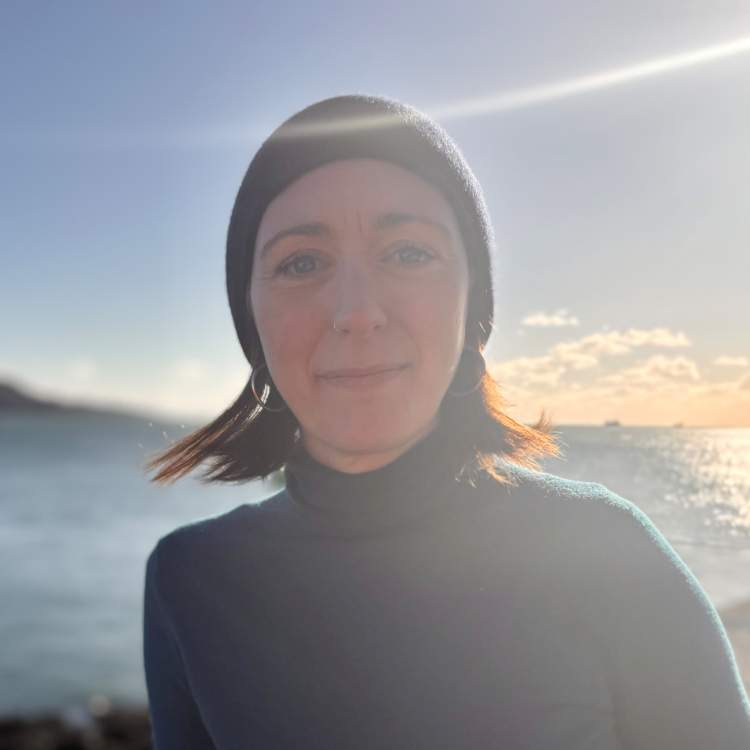
"Although invisible to the eye and detectable by us as only a slight odour on the sea breeze, DMS influences vital cloud formation processes, helping to naturally regulate Earth’s climate. After 15 years researching the production of DMS by tiny microbes in the surface ocean, I’m still amazed and inspired by this! "
Frances leads research on the production and cycling of climate-active marine trace gases in the surface ocean, focusing on climate-cooling compounds such as dimethyl sulfide (DMS), methanethiol (MeSH), and other volatile organic compounds. Understanding the processes behind their formation is essential for predicting fluxes to the atmosphere and modelling their influence on atmospheric chemistry and climate.
Her work spans diverse aspects of marine biogeochemistry, including the impact of ocean acidification on trace gas production, DMS emissions from corals during air exposure, the role of DMS in the palatability of microplastics to copepods and the production and cycling of DMS and its algal precursor DMSP.
Beyond sulfur biogeochemistry, Frances contributes to projects on water quality and pollution, including pioneering research on the effects of UV-filters from commercial sunscreens on marine organisms.
Frances is committed to science outreach. She presented at the Exeter Soapbox Science event (June 2022) on “The smell of the sea, plankton, clouds and climate” and featured in two BBC World Service programmes in May 2023 (Unexpected Elements and CrowdScience), discussing her research on climate-active gases and sea-air composition.
Outside of her work at PML, Frances is passionate about nature and conservation. She actively supports local biodiversity initiatives and serves on the committee of the Brent Island Trust (brentisland.org.uk), a community-owned nature reserve on the edge of Dartmoor.
Key Projects
- Closing the budget in marine atmospheric Oxidative Capacity through the quantification of Oceanic VOC emissions (COCO-VOC), NERC Large Grant
- Constraining the Role of Sulfur in the Earth System (CARES), NERC Large Grant
- Microbial degradation of DMSO in seawater, NERC Standard Grant
- A multidisciplinary study of DMSP production and lysis – from enzymes to organisms to process modelling, NERC Standard Grant
- Is bacterial DMS consumption dependent on methylamines in marine waters? NERC Standard Grant
- Earth’s coolest organsulfur molecule: understanding how agriculture can be more cooling to the climate, NERC/BBSRC Rapid Response Grant
- Terrestrial DMSP: the forgotten source, NERC Standard Grant
Selected Publications
Yang, M., Phillips, D. P., Hopkins, F. E., Liss, P., Suntharalingam, P., Carpenter, L. J., … & Dall’Olmo, G. (2025). Marine biogeochemical control on ozone deposition over the ocean. Geophysical Research Letters, 52(12), e2024GL113187.
Hodge, A. A., Hopkins, F. E., Saha, M., & Jha, A. N. (2025). Ecotoxicological effects of sunscreen derived organic and inorganic UV filters on marine organisms: A critical review. Marine Pollution Bulletin, 213, 117627.
Hopkins FE, Archer SD, Bell TG, Suntharalingam P, Todd JD. The biogeochemistry of marine dimethylsulfide. Nature Reviews Earth & Environment. 2023 Jun;4(6):361-76.
FE Hopkins, SM Turner, PD Nightingale, M Steinke, D Bakker, PS Liss (2009) Ocean acidification and marine trace gas emissions. Proceedings of the National Academy of Sciences (USA), 107, 760. doi:10.1073/pnas.0907163107
SD Archer, SA Kimmance, JA Stephens, FE Hopkins, R Bellerby, K Schulz (2013) Contrasting responses to ocean acidification of DMS and its precursor DMSP in Arctic waters. Biogeosciences, 10, 1893-1908. doi:10.5194/bg-10-1893-2013
FE Hopkins, TG Bell, M Yang, DJ Suggett, M Steinke (2016). Air exposure of coral is a significant source of dimethylsulfide (DMS) to the atmosphere. Scientific Reports, doi:10.1038/srep36031.
J Procter, FE Hopkins, E Fileman, P Lindeque (2019) Smells Good Enough To Eat: Dimethylsulfide (DMS) Enhances Copepod Ingestion Rate of Microplastics. Marine Pollution Bulletin, 138, 1-6. doi:10.1016/j.marpolbul.2018.11.014
